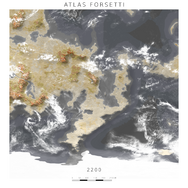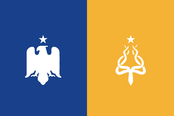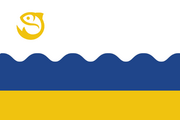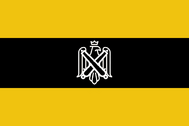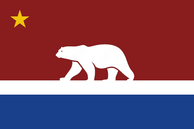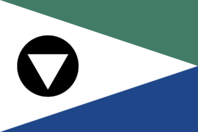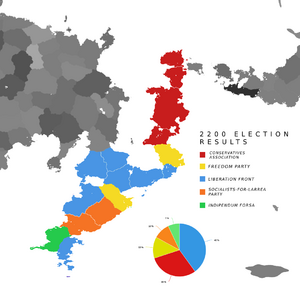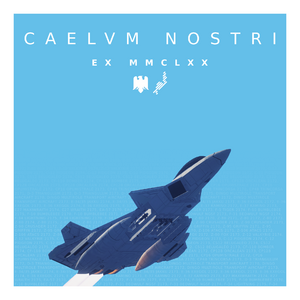Larrea
|
The United States of Larrea
The United Federal Larrean Republic of the Republic of Alecton-Gallante, Federation of Delras, Republic of Salred, People's Republic of Areittia and the special autonomous Federal Republic of South Forsetti
|
|||||
|---|---|---|---|---|---|
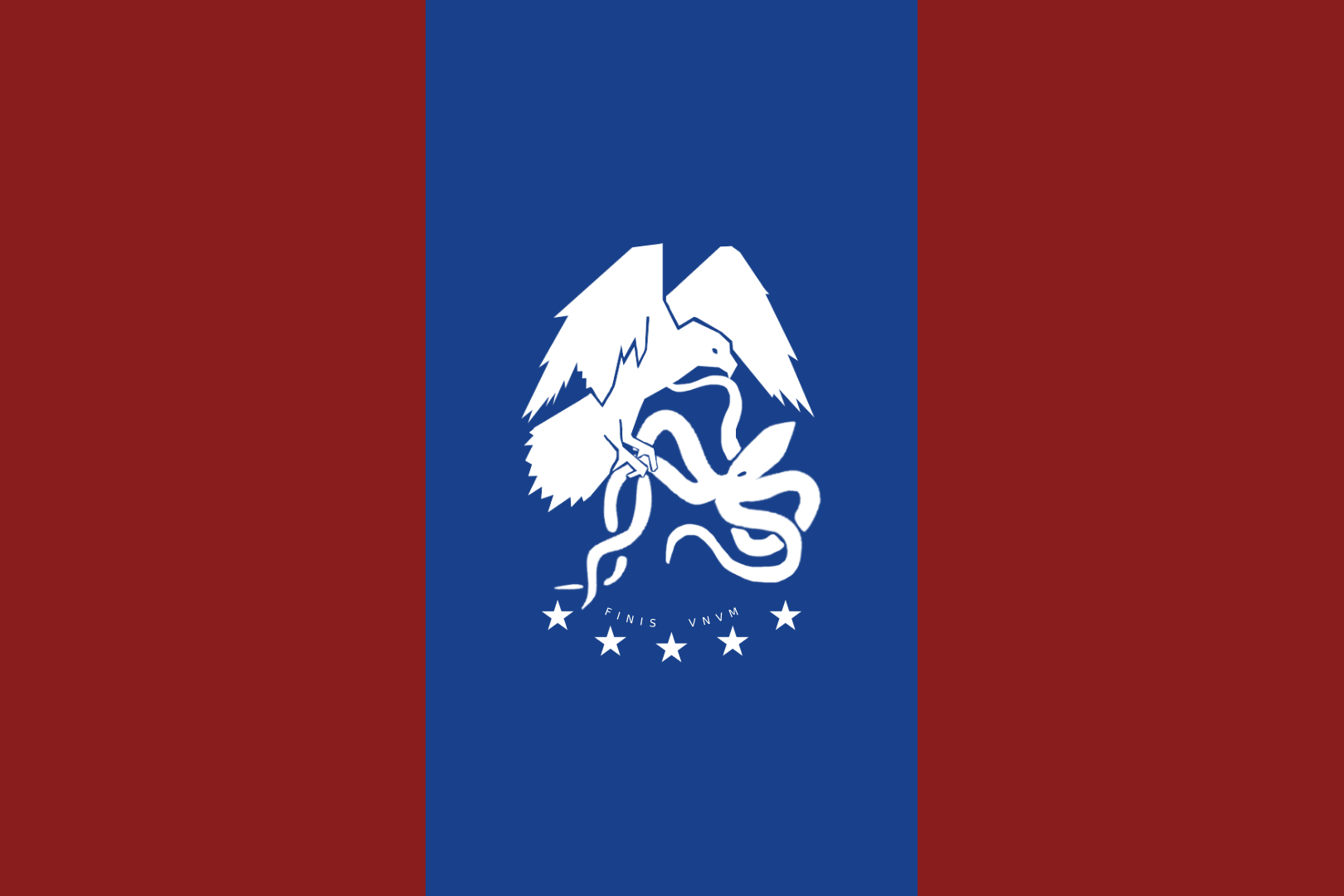 |
|||||
| The flag of the union | |||||
| Motto | "Fortitudo multorum, finis unum" (The Strength of Many, One Goal) |
||||
| Common Name | Larrea | ||||
| Anthem | "Aurum et Sanguinem" (Gold and Blood) |
||||
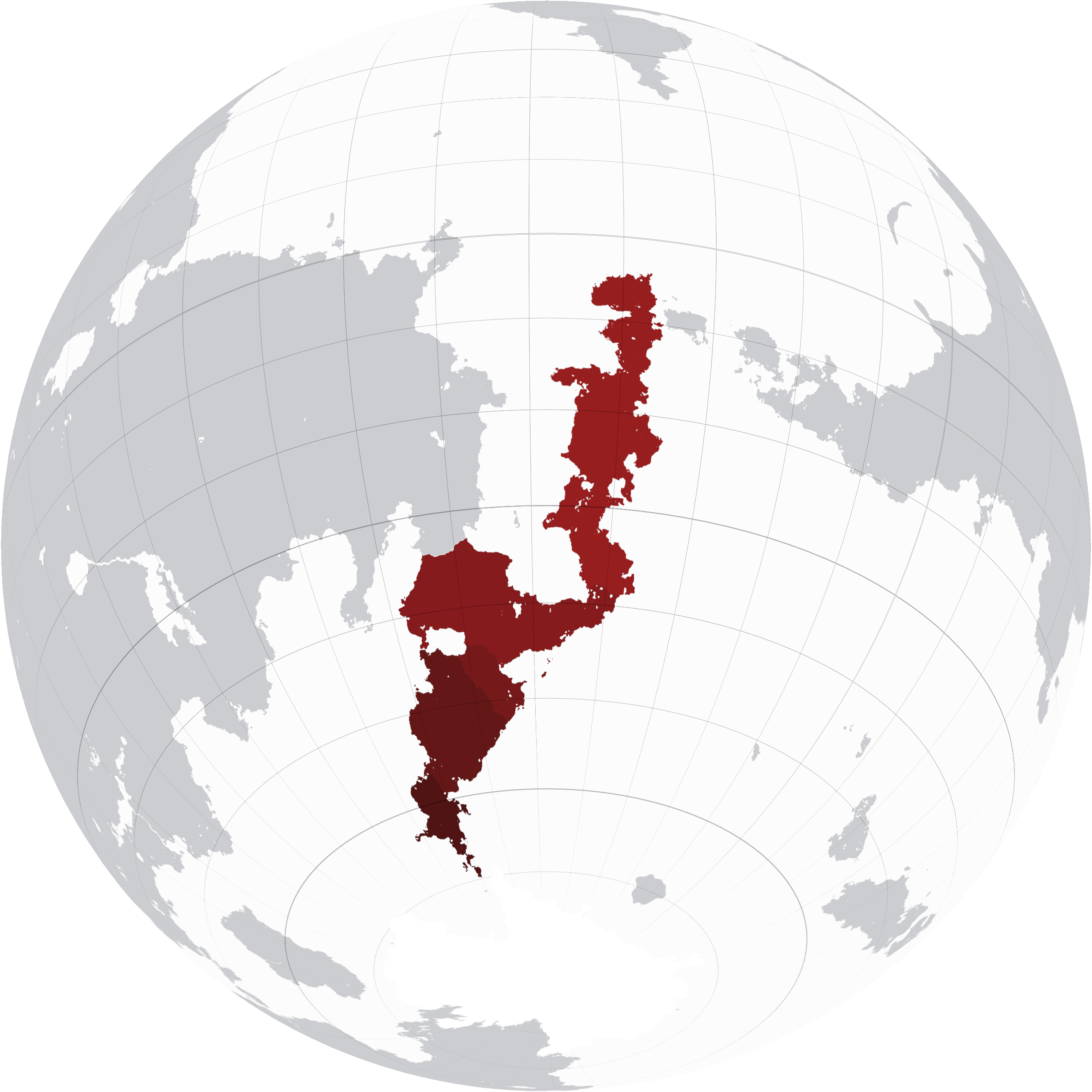 |
|||||
| All internationally recognized territories of the USL | |||||
| Demonym | Larrean • Larric • Forsetian • Forsa | ||||
| Official languages | Delrassi • Forsetian creole | ||||
| Currency | Larrean Forsa | ||||
| Politics | |||||
| Capital | New Forsetia | ||||
| Government | Federal Republic | ||||
| Foundation | 2170 | ||||
| President | Florenzi Montano | ||||
| Preceded by | Forsetti | ||||
| Demography | |||||
| Ethnicities | Gallante/Alectonian • Valerian • Delrassi • Blythe • Salredi • Erusi • Forsetian • Feguan • Zokesian | ||||
| Population | 28,853,801 | ||||
| Area | 72,327 km² km² | ||||
The United States of Larrea, also known as Larrea (La-ray-ah) or Forsetti, is a country located on the Forsetti peninsula to the southeast of Doren, in the area known as Baskay-Caledon. The state of Larrea is a federal presidential constitutional republic, having four states and one special autonomous zone. The state capital is New Forsetia (For-see-shah), located in Delras. The union has a total population of roughly 29 million. It contains some of the largest cities of the region, with the largest being New Forsetia and Ikacci (E-ka-chi). The republic was formed after the violent and bloody revolution of 2170, that was followed up by a civil war due to economic and social collapse of the peninsula, tearing up the former nations of Erusia, Delras , Alecton and Forsetti and leading to the deaths of millions. During the revolution, a small military faction in Alecton spearheaded a cause for unification, who had a string of military and social successes which lead to them starting the first drafts of the nation of Larrea shortly thereafter. The date of foundation is to this day still debated, but most agree that the idea of Larrea was started when the Unification Front, now the Liberation Front political party, was founded, although the first constitution was written in 2175. State independence was held in high regard, and today each of the states have a high level of autonomy. Uniquely, the constitution stated that each of the four original states had to house all or nearly all of each respective military branch. Alecton-Gallante houses the space force, Delras houses the navy, Salred houses the air force and Areittia is home to the army. Notably, South Forsetti is not part of this arrangement because of their late entrance into the republic, although a case could be made that they house Confederate military units, completing the five-way military pact.
Etymology
The endonym Larrea comes from the ancient Thalassi word for the Forsetti peninsula, Lartsuaarreit, meaning "southern land". Over the centuries the name became more compact and influenced by outside languages, resulting in the later name Larrus and Larreanium , eventually becoming Larrea. The name Larrea became an unoffical name that referred to the Forsetti peninsula, specifically used by members of the Thalassi religion. After the 2170 revolution and civil war the fledgling republic wanted to distance itself from the previous institutions, thus choosing to bring the name back as the official title of the nation as was originally proposed by the unification group. Interestingly, the second part of the word Lartsuaarreit is also believed to be the origin of the name of Areittia, although this is still disputed among etymologists.
The Flag
Larrea's flag is a radical departure from the flags that were used historically on the peninsula. After the civil war, a competition was held where everyone in the republic could submit a design to their state government, which would then get sent over to the federal government. This gave the first rendition of the flag in 2176, as well as the design for the seal of the republic. The current design was applied in 2182 by president Azzurri after South Forsetti was formally incorporated into the republic. The Flag of Larrea is built up of three vertical bars, the center bar being blue while the two flanking it are red, with the coat of arms centered in the blue bar. The blue stripe represents hope for the future, as well as the oceans that surround the republic and the skies above all. The red stripes represent the lessons from history and the uncertainty of the future, and the soil of the peninsula. The coat of arms the Forsetian eagle battling the Thalassi kraken above the motto of the republic and five stars. The eagle and kraken both have deep roots within the culture of the peninsula, and their eternal stalemate represents harmony and competition, democracy and theocracy, liberty and dignity and expansion versus enrichment. The motto of the republic also echoes this sentiment. The five stars represent the constituent states that make up the republic. The old flag had the same design but used a stylized icon of the kraken as well as the four stars of the former four states of Larrea. This icon has now become the seal of the government and is used on most federal paperwork and media.
Geography
The shape of the country, considered to be tall and slender, plays a large part in its unique geography. The landscape changes significantly, moving from the shores and jungles of Gary and the Alecton space port, through the bustling metropolis of New Forsetia, through upon the vast fields Delras that feed the nation, through the cold forests of Areittia, and arriving on the frigid shores of South Forsetti. Larrea's topography is marked by the absence of significant mountain ranges, the highest peak located in Alecton-Gallante. Instead, the nation features rolling hills, plateaus, and expansive plains that vary in elevation. The lack of imposing geographical barriers allows for the relatively unrestricted movement of species and the development of unique ecosystems throughout the country. Extensive coastlines along both the western and eastern coasts contribute to Larrea's diverse climate. The northern regions, situated near the equator, experience tropical rainforests, while the southern areas, approaching the South Pole, exhibit colder climates, potentially including tundra or subpolar condition, with the most southern areas being within the arctic circle. Noteworthy is the Forsetti bay, a large body of water that leads to the capital. This bay is the most densely inhabited area in the entire nation, with an estimated 10 million people inhabiting the metropolitan areas surrounding the shores. It is also home to the busiest maritime ports, as well as housing the heart of the Larrean navy.
States
Republic of Alecton-Gallante
The most religious of all the states, the Republic of Alecton-Gallante has a storied and troubled history, filled with wars, regime changes and devastating losses. The state is distinguished by its profound religiosity, which has both provided solace during times of turmoil and spurred on great achievements. As an integral part of the peninsula, Alecton-Gallante shares the profound maritime heritage that characterizes its neighboring states. Proficiency in naval exploration and fishing is deeply ingrained within its people, a testament to their enduring connection with the surrounding waters. Bolstered by their passionate belief in a storied and sometimes mythical past, the citizens take immense pride in their cultural roots.
Remarkably, Alecton-Gallante has ascended to a position of prominence within the realm of space exploration. Fueled by their religious motivations, the republic has become a preeminent player in the domain of space travel, leveraging this newfound strength to wield considerable influence within the union. Their compelling drive has translated into a robust presence both within the union's legislative body and in various social gatherings, where their fervent ideals have fostered connections and shaped dialogues.
Geographically, the republic's terrain offers a diverse tapestry of landscapes. Within its borders stands the tallest peak found within the entire union. However, this impressive elevation contrasts with the overall flatness that characterizes much of the peninsula. The northern reaches are covered in lush jungles and thriving mangrove forests, an ecological richness that gives way to cultivated farmlands and expansive plains as one journeys southward. The climate is similarly tropical, with large amounts of rainfall in the north and very hot humid summers. Within the sprawling territory, a population of 7.2 million calls Alecton-Gallante home, converging in various urban centers that embody the state's vitality. Also noteworthy is the large population of Feguans in the state, who arrived on the peninsula centuries before.
At the heart of this spirited republic lies Ikacci, its bustling state capital. With a population numbering 2 million, Ikacci stands as a pivotal urban hub within the union. Its robust populace and vibrant infrastructure make it one of the largest and most dynamic cities within the region. The surrounding areas are also home to some of the largest industrial sectors of the union, with large plants producing high fidelity aerospace grade materials for the military and space industry.
Delras
The Federation of Delras, more commonly known as Delras stands as the most prominent and influential among the states comprising the union. Its expansive population, totaling a robust 14.4 million residents, serves as a testament to its significance within the larger framework of the nation. Notably, Delras holds the distinction of housing the union's capital, New Forsetia, which mirrors its own substantial population with an impressive count of 4.3 million inhabitants. New Forsetia is distinct from other cities in the union for being a special economic zone, which gives corporations in the city more power and freedom to expand upon their business. This has resulted in the city having the highest average GDP of the union, while also having the highest rates of income inequality in the union. Delras also is home to the Larrean Navy, with the largest military port being the New Forsetia port.
The old capital of Dresa with a population of 1 million still holds an important position in the state with many of the regional governmental facilities being there. Dresa was home to the final stand of the civil war, and holds a special cultural place within the republic. Many of the older Delrassi residents still staunchly oppose the construction of the capitalist corporate haven which New Forsetia seems to have become and regularly hold protests to move the capital back to Dresa, with some fringe groups even calling for the destruction of New Forsetia.
Politically, Delras occupies a central role, not merely due to its populous cities but also as the custodian of the bulk of Larrea's federal government facilities. The concentrated presence of these pivotal institutions further underscores the state's political weight and command. Nevertheless, the populace's perception of the Delrassi government is mixed. The administration's image is marred by allegations of corruption and bureaucracy, perpetuated by antiquated laws and traditions that, to some, appear incompatible with modern sensibilities. The old communist government is remembered with both hatred and melancholy in the present republic, with many of the older generations having fond memories of the previous government. After the events of 2170, millions of previously Erusian (now Areittian) refugees fled up north to Delras looking for a fresh start to life, together with many many people from neighbouring regions. Since the neighbouring nations were all similar in terms of language and culture this great mix up went smoother than most. What it did result in was Delras becoming the largest and most influential nation due to the population increase. Even though the demographics of Delras were changed massively, the federation still contains the sizeable Blythe community which have lived there for over a century.
However, beyond cultural motifs and political intricacies, Delras boasts a robust economic landscape anchored by its traditional expertise in fishing. It prides itself as the preeminent producer of food and fishing exports throughout the entire union. The state's long-running fishing industry sustains its prominence as a primary contributor to the broader economy. With bountiful access to marine resources, Delras has nurtured a legacy of maritime enterprise that not only feeds its own populace but extends its reach to provide vital sustenance to the entire nation.
Geographically Delras is very flat and lacking of any large mountainous features. The lush agricultural landscape has given rise to a large farming industry, resulting in Larrea as a whole becoming the largest exporter of grain and other goods in the region. The warm gulf in the north gives the northern coast a temperate climate, perfect for agriculture.
Salred
The Republic of Salred, nestled between Areittia and Delras, stands as a pivotal hub for both strategic defence and industrial prowess. Distinguished as the headquarters of the Larrean United Air Force, Salred's strategic significance is underscored by its vast airspace and flat terrain, which accommodates the largest air force base in the region. This geographic advantage has propelled Salred into a preeminent role in the Larrean Air Force, shaping its identity as a guardian of the skies.
The geography is perfectly suited for aviation as was mentioned before. The lack of any major mountains or even large hills makes it the perfect place for industries like farming and large solar and wind energy facilities. Fishing is, just like many of the other states, a large facet of Salred's economy as it has prime access to the Forsetti bay to the west and the ocean to the east. It has a very similar climate to Delras, but more severe storms often pass through Salred originating from the ocean.
With a population of approximately 900,000, Salred exudes a homogenous character that is emblematic of unity amidst diversity. The populace, leaning towards atheism, is recognized for its diligence and industrious spirit. However, this reputation is tinged with perceptions of being humorless and unexciting among their union counterparts. Regardless, Salredis take pride in their technological achievements and domestically manufactured goods, cementing their status as a potent economic force within the union.
Anchored by a thriving economy, Salred is marked by a diversified industrial landscape. The rich expanse of its territorial waters bestows a vibrant fishing industry upon the nation, supplementing its energy and manufacturing sectors. The heartbeat of this industrious nation resonates from its capital city, Tria, where 270,000 souls call home. From its bustling streets to the hum of factories, Tria epitomizes the synergy between urban life and industrial progress.
Salred's political landscape bears the marks of tension and contention. While the nation grapples with an oligarchic regime, dissent and unrest surge through its streets in the form of frequent riots. Yet, this compact nation yields an outsized influence within the union's corridors of power, a testament to its substantial wealth and economic might. As one of the union's financial pillars, Salred commands a significant voice within the union senate, shaping collective decisions and the destiny of the federation.
People's Republic of Areittia
The People's Republic of Areittia (Array-tia) otherwise known as Areittia or the PRA is the sole socialist state within the union, marked by its distinctive independence, rivaled only by South Forsetti. Emerging as a crucible of transformation shortly after the tumultuous events of the Forsetian unification and the revolution of 2170, Areittia itself underwent a sweeping revolution that redrew its socio-political landscape, away from their previous involvement within the former state of Erusia. The violent and bloody conflict erupted after the revolution started in Delras, and over a million people perished in what was Erusia as a result of the civil war that took place. Millions more had fled to neighbouring regions. Characterized by a pronounced secular outlook, the state is considered the most atheistic among its counterparts. Despite this, Thalassi Krakenism, once fervently observed by the populace further north, holds minimal sway in the political realm, its influence now largely confined to modest social spheres.
The Areittians themselves stand apart from their northern brethren, marked by a demeanor that reflects their reserved and often chilly environment. This inclination towards introspection mirrors their climate, where mild summers contrast with punishing winters, a climatic duality shaping both character and culture. While the nation is under the continued governance of the ruling socialist party, its once-unassailable popularity wanes progressively as the years unfurl.
Central to Areittia's identity is its integral role in the Larrean army, hosting a substantial portion of its military infrastructure. Despite conscription being a shared norm across the states, Areittia boasts exceptional retention rates among those who continue their service beyond this mandatory period. This phenomenon is attributed to the cultural significance attributed to the role of "warriors" and their dedication to the nation's defense. Home to a population of 1.4 million, the capital city, Vemirka, accommodates 300,000 inhabitants and stands as a nucleus of activity. Notably, it houses the central armory of the union and accommodates a majority of stationed divisions.
Geographically, the landscape is predominantly dominated by taiga forests, interspersed with pockets of tundra to the south. An inclination towards isolationism sets Areittians apart, fostering a distinctive identity that resists assimilation into the larger union. However, rooted in its foundational history, Areittia remains steadfastly loyal and committed to safeguarding Larrea, pledging unwavering defense through any exigencies.
Federal Republic of South Forsetti
The Federal Republic of South Forsetti, colloquially known as South Forsetti or Foresti, stands as the newest member state within the Larrean Republic. Distinguished by its special autonomous zone status, the region plays an integral role in the collective framework of the republic. Originally established as a Zokesian colony in the 21st century, South Forsetti emerged as a beacon of hope for displaced Zokesians seeking a fresh start on a new continent following the upheavals of that tumultuous century.
Having changed hands multiple times over nearly two centuries, South Forsetti has steadfastly retained pride in its Zokesian heritage. This cultural continuity led to the development of Forsetian Creole, currently the second most spoken language across the continent, being a hodgepodge of Zokesian, Arcovii, Delrassi and Erusi. The state, serving as one of the few unscathed areas on the peninsula after 2170, owes its resilience to assistance from the Confederacy. Despite maintaining a more neutral stance during the conflict, the populace expressed deep sympathy for the hardships faced by those beyond their borders. This sentiment manifested in massive protests and riots demanding the government's active involvement in aiding refugees and supporting restoration efforts.
These protests, occurring both within and outside South Forsetti, culminated in the nation's increased integration into the newly formed republic in 2180. Despite this integration, South Forsetti retains strong ties to the Confederacy and maintains formal membership in many of their organizations. Over the years, the state has progressively aligned itself closer with the Larrean Republic, participating in the Larrean parliament and benefiting from defense provided by a collaborative Larrean and domestic Confederate military coalition. This has resulted in many considering South Forsetti as the unofficial fifth military branch of the republic, due to their unique domestic design language.
The state, with a population of 5 million, ranks as the third most inhabited region in the Larrean Republic. This demographic prominence grants South Forsetti significant social and political influence, allowing the introduction of avant-garde ideas to the wider republic. Geographically, the area experiences mild summers and harsh winters, with snow and ice covering substantial portions of the landscape. While slightly more hilly than other regions, the terrain remains predominantly flat.
The largest city, Gralenberg, with a population of 800,000, serves as the hub for governmental and financial institutions. Historically self-sufficient in food and industry due to its long-standing independence, South Forsetti has witnessed a shift since joining the Larrean Republic. Abandoned grain fields, farms, and factories bear witness to this transformation, as many residents have migrated to urban centers in search of service-oriented employment opportunities.
Politics
Government
Larrea functions as a federal republic, with two legislative bodies. The senate, otherwise known as the first body, is the upper body, consisting of 50 members. The house of representatives, otherwise known as the lower body, consists of 200 members.
As of 2200, the acting president is Florenzi Montano.
Aurelién Juliano 2176-2180 - LIBS
Marco Azzurri 2180-2184 - CON
Cesare Montano 2184-2188 - LIBS
Florian Gernitz 2188-2192 - FP
Aleki Anae 2192-2196 - CON
Florenzi Montano 2196-2200 - LIBS
Florenzi Montano 2200-now - LIBS
Subdivisions
-
Foreign Relations
Connected with the Larrean-Ikonic superhighway and the Junnel to Ikonia.
Languages
While many languages are spoken in the republic, Delrassi is by far the most commonly spoken and written. The constitution does not technically have a clause dictating the official language, but since over 80% of the population can natively speak Delrassi it has been unofficially adopted for all government documents and communications. Forsetian Creole is the second most spoken language, largely due to the state of South Forsetti using it as their main language. All former languages on the Forsetti peninsula were related to eachother, only sharing minor differences in vocabulary and pronounciation. In the 2150's the largest differences in the languages were mostly reorganized and homogenized. Still, the existing speakers of the dialects still insist on their independence. Alectonian, Valerian, Blythe, Salredi and Erusi are thus considered as unofficial languages. The languages that do not originate from the peninsula that are spoken the most are Feguan and Zokesian. Feguan is mostly spoken on the northern coast of Alecton, and Zokesian is mostly spoken by the elderly generations in South Forsetti.
Military
The Larrean armed forces is split up into the army, navy, air force and space force. From 2179 until 2183 the marines were the fifth branch, but they got incorporated into the navy. Each state houses a respective branch, with South Forsetti housing a hybrid defense agreement with the confederacy. The primary arms manufacturer is SPACOM. Noteworthy is the controversial Thallas battalion, operating out of Alecton.
Army
-
- 10 New Forsetia-class destroyers, produced by Ikai-Marion Heavy Industries
Air Force
-
Space Force
-
History
Regional decline
2150-2170
Financial decline, unhappy populace. Collapse of Forsetti. Coup in alecton and erusia.
The collapse
2170
The civil war
2170-2175
factions: Unification front, the communists, the caliphate and the PMC
2170:
Alecton military invades delras unofficially, military takes control of alecton in a second coup
delras declares war on alecton
Alectonese rebels fight delras and the alecton military
rebels commit terrorist attacks in salred and erusia
salredi PMC starts a coup and takes control in the chaos
alecton military is infiltrated by rebels and is taken over, establish religious caliphate
erusia invades delras and salred
delrassi government also collapses, delras becomes the battlefield of the factions
2171:
UF is established in alecton, fight back against the caliphate and establish ground in delras
the PMC has great success in erusia, capture vemirka
communists push into delras
2172:
UF with foreign aid push hard south, invade salred
caliphate suffers internal strife, hundreds of factions form
communists bunker down in erusia
2173:
UF liberate salred from the PMC, many of their units are incorporated
unknown special forces units land in northern alecton, caliphate units are suddenly allied with the UF in the north
caliphate pushes south, holds the line in the north
2174:
caliphate reaches Dresa, UF-Caliphate southern front line stops moving
UF conquer the rest of delras, and integrate all local militias
UF formalize into a quasi government, establish a deal with the communists
2175:
Dresa remains sieged
UF writes the constitution
Caliphate performs suicide charge into Dresa with remaining resources
charge is a failure, caliphate units flee north
UF contacts the remaining unified caliphate factions to mediate peace, officially sign the ceasefire
Speech by Aurelién Juliano, given the eve of the final battle of Dresa as commander of the city's forces on november 13th 2175 as a response to rumors of mutiny going around the defense forces:
Attention, men.
I have been made aware of whispers of despair and mutiny. These are heavy times, and such whispers are not uncommon. But I want to be clear about one thing: I am not a slave to law or order; I chase freedom. Yet, I am not a slave to freedom either. To be a slave to ideals is to be constrained to a singular thought, a singular purpose. We are not slaves to freedom; we are defenders of it.
If your heart cannot bear to do an action which defies your instinct or better judgment, it is your right to choose apprehension. If any of you are hesitant to engage in tomorrow's battle, you may hang up your rifle and leave now. You are not my slaves, and you are not the slaves of our dream.
But before you do, consider this. My grandfather used to tell me whenever I was scared of the dark that it was not the torch I held in my hand which scared the monsters of the abyss, but the act of holding on to the torch that drove them away.
We are outgunned. We are running out of ammunition. Your armor is falling apart. You have broken bones. We are facing certain death. We are not just staring directly at the darkness; we are completely surrounded by it. Our torch is broken and running out of light.
But my grandfather was no gullible man. I understood what he meant. We may be outgunned, we may be running out of ammunition, and our armor may be falling apart. We may have broken bones, but what will never break is the will of a man with a dream. We must hold on to the torch. Clench it tightly. The torch shall not be extinguished by death; even beyond death, we pass on the torch.
We stand on the shoulders of our fallen comrades, not because we were lucky, but because they have entrusted us to carry on their legacy. They have passed us the torch. The torch burns with the fire of your hearts. To leave the torch behind is to forget the dead, to forget they were even there.
We joined the front because the darkness took our homes from us. We joined the front to build our new home. Any home needs a foundation. This home is built on our shoulders, brick by brick. It was because we held on to the torch that we made it here. We fought off the fascists in Alecton. We fought the communists in Erusia. We fought the foreign legions in Tria and liberated Salred. We liberated Delras. We didn't do this because of dumb luck. The hands of the dead placed the bricks we stand on now. We won't just drive the darkness away; we will build our home. Because even if we die, we built the foundations for our children to play on.
So I must ask you all again. If you wish to give up the fight, leave now. May Thallas have mercy on our souls. Because even if you will not, Dresa will stand.
This speech, known colloquially as the Decree of Dresa, has since then been referenced frequently in Larrean literature and media. The words "Dresa will stand" has become the city's motto. The same words are also etched on the navy ship USLS Dresa.
Unification
2176
Unification front, rebranded to Liberation front, incorporate the remaining factions into the union. States are drawn, the senate and house of representatives is created, and the military is formed. Juliano, leader of the UF since 2172, is elected president in the first election in 2176 as head of the Liberation Front party.
Many parts of the unification were deeply unpopular with certain groups of people within the republic. Especially in the deep north and south it was met with riots and general chaos, and only relented after years of incorporation programs and domestic immigration. The following quote is an interview with an 80 year old veteran and former commander of the communist forces of what is now Areittia:
As one of the most decorated veterans of the republic, how did you end up on this remote farm?
I live a simple life now really. Unlike people the capal don't hold grudges. I got into raising them due to my uncle, who was Sahren. The steppe may look harsh but once you get to really know the landscape it has a simplistic beauty to it. Considering this government has done nothing for me i feel i owe it nothing in return.
You have been through many events that shaped not only this peninsula, but the entire planet. As many people may know you refused to take the position of minister of defense of the republic. What is your outlook on the current state of Larrea?
A friend of mine once said that people only care about what you have to say when you have reached the final page of your book. My opinion on these sorts of matters is no more important than any other citizen. You journalists are all the same. You drive all the way here just to ask me this? Then i will tell you this. The foundations of the nation we now reside in are built on lies. Every banner that springs up is no more than paint on cloth. I have shed blood for many banners, and have lost countless comrades to these ideologies. I have concluded that it is meaningless. These banners are only used to wrap around our necks and hang us in the gallows of ignorance. Once upon a time i believed in the power of these banners, and i devoted my life to fighting for them. I gave my fullest for them, and saw the death and destruction that followed as necessary evils for the greater good of the country. But the greater good never gave me anything back, except the coffins of my people. Erusia was built on lies, Doren was built on lies, Panka was built on lies, Forsetti was built on lies, and the cycle only continues now. Everything i fought for only gave me pain and regret in return. Those Delrassi snakes have the gall to kill thousands of my men and then ask me to be part of their government? Did they fall off their capal or something? All these medals they send me won't convince me otherwise, you may as well be pissing on the graves of me and my comrades. The least i can do is spit on their authority. And the Delrats send their pawns to me asking for forgiveness? Go and ask that god of yours for forgiveness for all those you have and continue to kill.
Thank you sir for your service and your answers, we will be concluding this interview.
My pleasure, Delrat.


